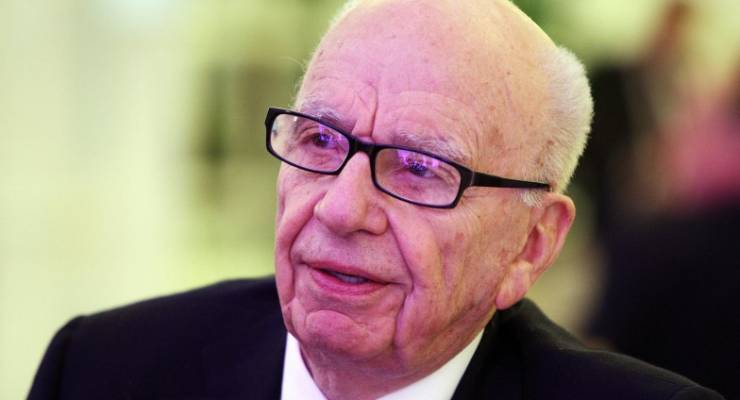
A miserable quarter for News Corp has foreshadowed more deep cost-cutting to come, especially in Australian and non-metro newspapers.
Heading for a loss for the year to June, News Corp has suffered from advertising slumps, falls in book and newspaper sales and a digital property listing collapse — offsetting continuing gains on its digital subscriptions in Australia, the UK and The Wall Street Journal in the US.
From the tone of a post-results briefing from CEO Robert Thomson and finance boss Susan Panuccio this morning, some of the cuts to come will be nasty.
News has already suspended 60 community newspapers in Australia and the cost cutters from Deloitte are reviewing all print holdings, with the concentration on those community papers suspended and the regional titles in Victoria, NSW and Queensland.
The fourth-quarter warning was contained in the March quarterly report which revealed the Murdoch family’s much-diminished second media company had been forced to take a new round of impairments totalling US$1.11 billion (A$1.7 billion), with US$931 million (A$1.5 billion) being taken against the value of Foxtel.
That pushed the company to a net loss for the quarter of US$1 billion (A$1.5 billion) and means the loss for the year to June, after the terrible results of the current quarter, will easily top A$2 billion. The remaining US$175 million was taken against the value of the just-sold News America Marketing business.
In a filing in April, News Corp warned that the COVID-19 pandemic measures such as social distancing and lockdowns would hit all its businesses and throw doubt on future earnings — hence the huge Foxtel write down. News operates in two of the most-damaged economies in the world — the US and UK. Australia has also been hit hard, even though the record here against the virus is among the world’s best.
In the March quarterly report the company revealed that ad revenues at Dow Jones in New York had fallen 20% in April but more than double that — 45% — in both Australia and the UK (including a 5% fall from currency moves).
Offsetting that has been a strong rise in digital subscribers across newspapers in April, “including over 20% year-over-year growth in digital-only subscribers at The Wall Street Journal“. There was a 120,000 or 25% rise in digital subscribers to the company’s Australian papers to a total of 613,000 at the end of March this year.
After the write-down and loss of subscribers in the March quarter, News said Foxtel saw a “fairly stable burn” in April (it was a very high 17.5% in the March quarter), and that the cancellation of sporting events would adversely effect churn rates. Sports streaming service Kayo has had a sharp decline in paid subscribers (272,000 on May 2, from 440,000 at the end of March), and commercial subscriptions revenues have also declined, with pubs and clubs closed and lower occupancy rates at hotels around Australia.
Book sales through bricks and mortar shops fell because of the lockdown, but e-book sales rose, showing positive growth for the first time in more than a year. The company’s Australian (REA) and US (Move) digital real estate businesses are seeing declines in new listings and real estate transactions as a result of the social distancing measures and business closures, as well as general economic uncertainty.
News said it was cutting costs across the board. Thomson said there had been “significant reductions” at the company’s New York headquarters in “recent days”. Panuccio made it clear that there would be a “more aggressive focus on cost reductions”.
News reported revenue of US$US2.27 billion (A$3.5 billion) for the quarter, down 8% from the same quarter in 2018-19. The company said the drop was caused by foreign currency fluctuations, a fall in print advertising revenue and lower subscription revenues at 65%-owned Foxtel.
Foxtel had 2.93 million subscribers at March 31 (up 1%), driven by growth from subscription service Kayo. But that had fallen by at least 172,000 since April 1 due to the sharp plunge in subscriber numbers at Kayo because there was no sport to stream.
Panuccio said Foxtel was not in breach of banking covenants and would not require further shareholder funding after News had to support it with A$700 million in shareholder loans in 2019, and Telstra kicked in with $170 million worth of support for the transmission costs Foxtel incurs using Telstra’s cables.
Foxtel has sacked or sent on leave around 500 staff across the business and cut the use of casuals and contractors.
News said that chairman Rupert Murdoch will not receive his annual cash bonus and Thomson said he would forgo 75% of his annual cash bonus. The size of those bonuses and the value of the decisions to forgo part or all of them to the company were not given.








great news hope, all their grovelling shock jocks and journos get the chop onto newstart and see how they like starving on $40 a day
I’m sure they could pull a few strings and find themselves new jobs at the AFR or SMH or even (their) ABC. What’s the difference these days anyway?
For all the pain this pandemic is causing and will cause, a little ray of light may be watching the Murdoch empire shrivel and perhaps fail.
Oh dear, how sad. Never mind.
Not often can it be said that bad news is good news, but this is it. Bad news for Murdoch’s NewsCrap is good news for many Australians. Its also said that the likes of Bolt, Credlin, Dean, Pahini, and a host of other Sky News muppets and no talent drones are hastening the demise of NewsCrap. Hooray!
Is it true that friendlyjordies on YouTube has a larger subscription base and following than Sky News?
I wonder how the Australian will fare after the old man experiences the one thing he can’t control?
Remember how the Bulletin survived Kerry Packer by a week.